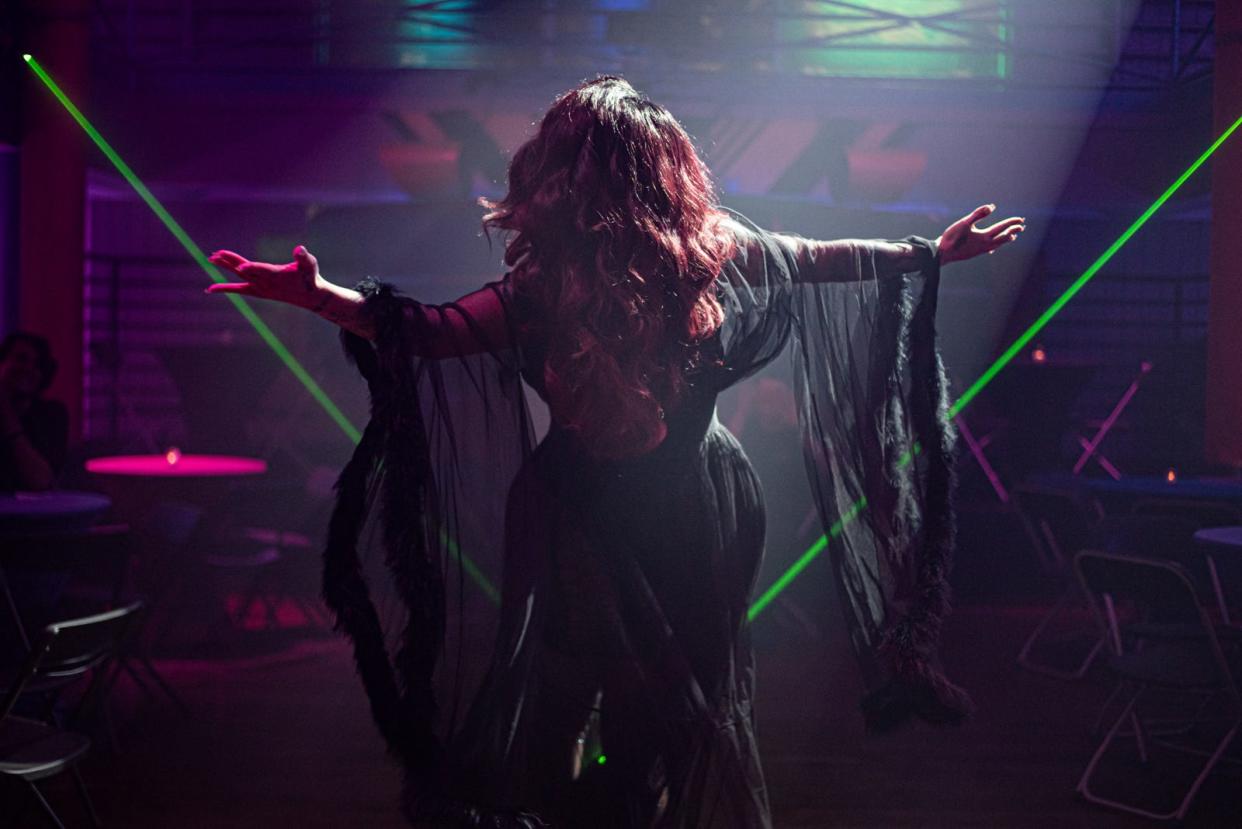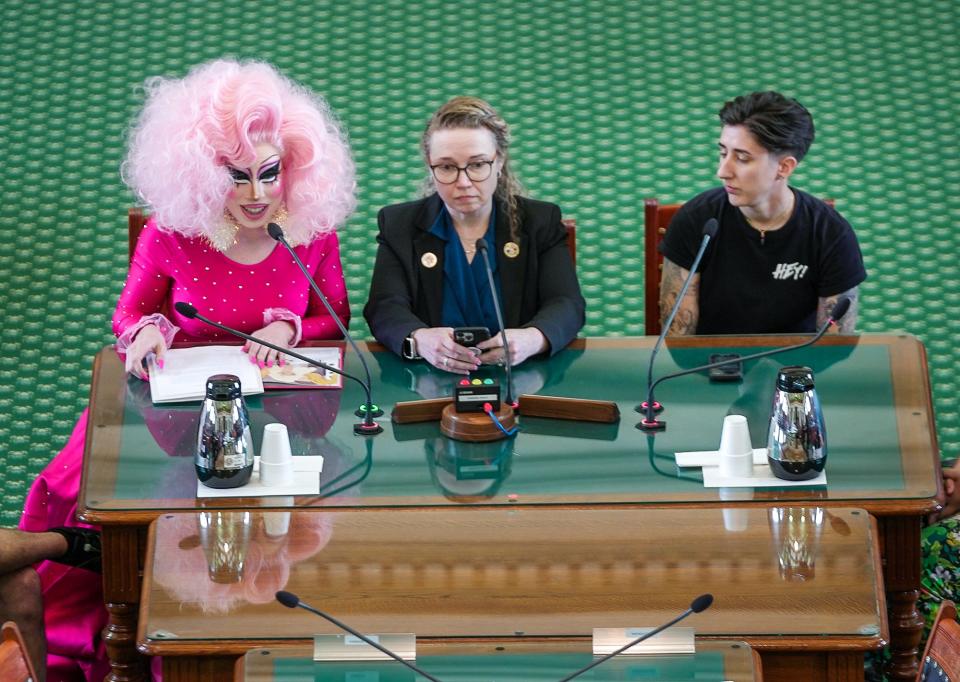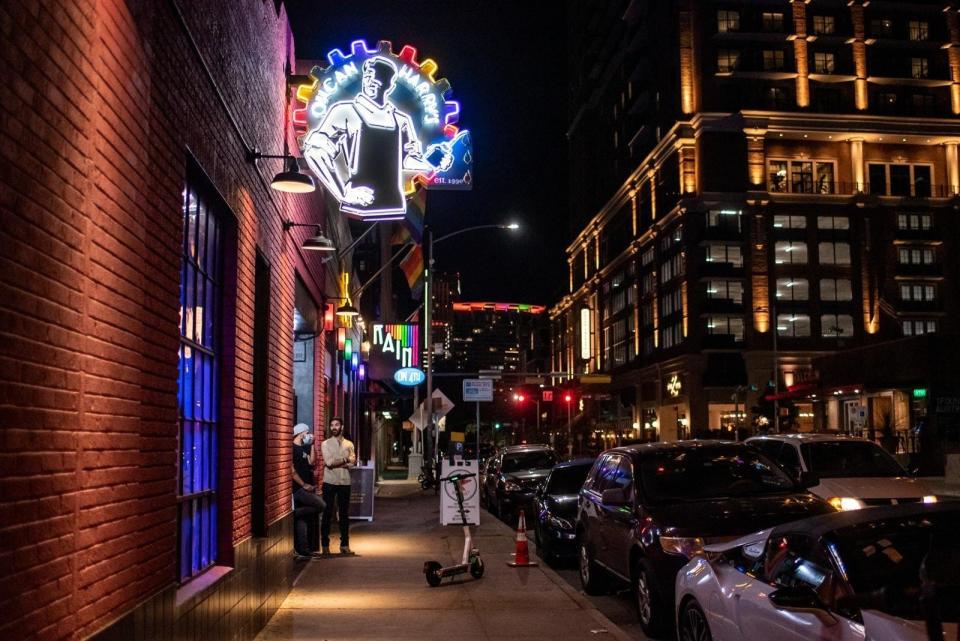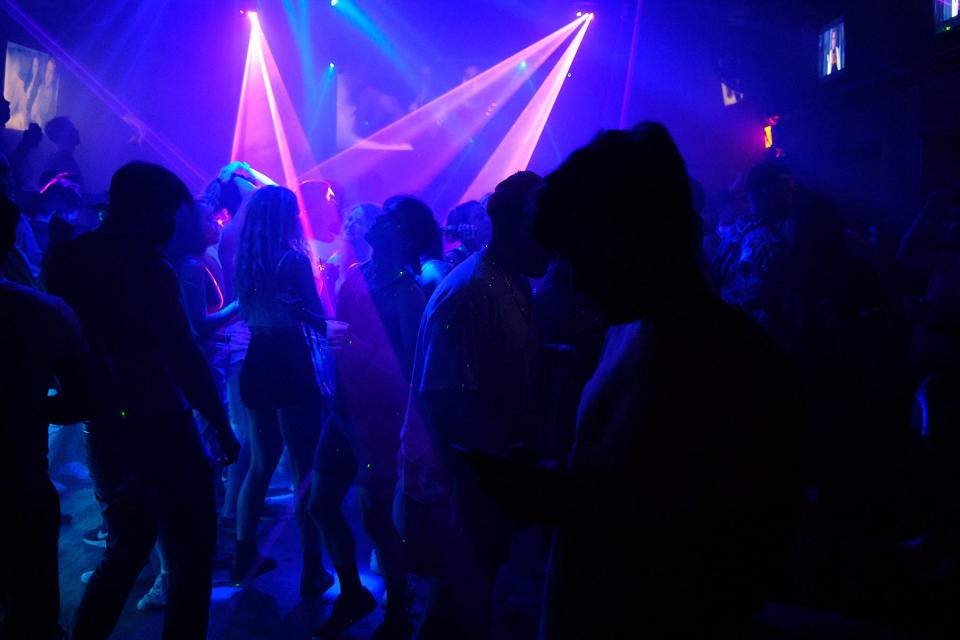Webb: Keep Austin's LGBTQ culture alive. It will save lives.

“Queer people are going to find themselves,” Brigitte Bandit, Austin drag artist extraordinaire, told me this week. “It’s so powerful whenever you see somebody who's like you.”
She's right. Our cultural spaces are where many of us find each other. The queer art happening inside and out helps us see ourselves clearly.
I wasn't out when I first started at the American-Statesman more than a decade ago, not even to myself. The gay journalists I worked alongside, and the stories of the LGBTQ community that we covered, helped me get there. Now, I'm closing another chapter at the paper and pursuing new writing projects. The transition has me thinking about the magic of queer culture in Austin and how it helped me come alive.
I've been enchanted under the moonlight by drag superstar Louisianna Purchase on the patio of Cheer Up Charlies. I've seen gay and trans stories told so truthfully in films at aGLIFF. I've witnessed Jon-Erik Garcia, aka Glitoris, paint sonic masterpieces at Barbarella's Tuezgayz, where bodies can yearn with honesty on the dance floor. I felt communal joy ripple through the newsroom when the Obergefell v. Hodges ruling came down, and we documented same-sex couples seeking marriage licenses. And most importantly, I witnessed the community keep pride alive in a pandemic.
So much celebration since I started in 2012, and yet, our current days often feel discouraging. I wanted to check in with a few movers and shakers and ask how they see the state of LGBTQ culture in Austin. The noise coming from the Capitol makes the conversation feel vast and confusing, but no. It's simple. Keep our queer culture alive, because it saves lives.
A vocal, determined movement among largely Republican politicians is working to codify into law policies that undermine the rights of LGBTQ people across the U.S. In Texas, this national wave has manifested itself through multiple bills — 140, by Equality Texas’ count — including those that would criminalize gender-affirming health care for transgender youth, restrict educators from talking about LGBTQ identities, and find various ways to ban or stigmatize drag performances, including defunding libraries that host drag queen story times.
For subscribers: Texas Senate bills seek to restrict drag shows. Here's what's being proposed.
I get frustrated at the conversations around these bills, which often frame them as matters of political debate. They are not. They are hateful actions. Ignorance cannot be claimed — how many impassioned pleas for understanding from queer people gathered at the Capitol does one need to hear to get it?
When backers of these bills claim they are protecting children, they must not mean queer kids. LGBTQ youth are more than four times as likely to attempt suicide than their peers, according to the Trevor Project, a suicide prevention organization. The nonprofit reported in December that 47% percent of LGBTQ youth here in Texas seriously contemplated suicide in the past year. Sixteen percent attempted it.
Even as adults, studies show, LGBTQ people are more lonely than their peers. That breeds mental and physical illness and can even lead to premature death.
I grew up consuming the rhetoric that animates policies like these, so the obfuscation lands like a cast-iron pigeon with me. As the entrenched lie goes, queer people are just beset by sinful impulses and sickness. Children are taught that homosexual attraction or gender dysphoria can be caught through social osmosis, or more perniciously, instilled through the perverse influence of predators.
In other words, those who support bills like these may not think queer kids exist — just straight kids who haven’t been corrupted yet. We hear from lawmakers about the threat of prurience, as if all personal expression from straight, cisgender people is as inoffensive as a rerun of "The Flying Nun."
“They're trying to keep queer people out of sight,” Bandit said about the Texas bills. “They don’t want queer people to exist publicly the way that we do."
It is generally a colossal mistake to mess with either Texas or drag queens. Messing with Texas drag queens, by my math, is doubly fraught. As LGBTQ rights advocates show up loud and proud to denounce the bills targeting them, drag performers look like superheroes for the cause, as they have since the days of Stonewall.

During South by Southwest, three stars of “RuPaul’s Drag Race” denounced anti-drag measures. Local performers like Cynthia Lee Fontaine and Nadine Hughes have been seen on the front lines of demonstrations, and Bandit went viral for her testimony before the Senate State Affairs Committee on March 23.
“I think drag gives people a space and opportunity to express themselves however they want,” Bandit told me, adding that the art form represents exploration of the “limitless possibility of what a person can be."
Queer culture, including drag, has been entering new spaces lately, she said. Many people see that as a threat.
“There’s a reason why drag has always existed in bars and nightclubs,” Bandit said. “It's because we always had to find ourselves in those dark spaces ... where we can exist outside of regular society."
That doesn’t mean that drag needs to stay in those bars and nightclubs. Coconut Club, where Bandit hosts one of her weekly revues, welcomed “RuPaul’s Drag Race” contestant and Dallas native Kennedy Davenport to its stage on April 1. The next day, Davenport made national headlines joining three of her fellow queens onstage with country star Kelsea Ballerini for a CMT Music Awards performance.

Still, Austin’s LGBTQ-oriented nightclubs are the primary venues for the painted and bewigged. More broadly, they are respites from life on the margins, where a queer life is fully legible.
The city has struggled even to keep those gathering spaces alive.
Last spring, a groundswell of opposition erupted when it looked like about half of Austin’s LGBTQ-centric bars would be displaced by demolition projects in the Warehouse District, long home to the city’s most prominent concentration of queer nightlife.
Opponents to the projects gave emotional testimony before the city’s Historic Landmark Commission. By June, one demolition project, at the site of the Iron Bear, moved forward, while a project that would displace the city’s oldest operating gay bar, Oilcan Harry’s, as well as newcomers Coconut Club and Neon Grotto, crawled ahead with caveats — namely, that developer Hanover Co. make good on its promise to include space for Oilcan Harry’s in its final plan. (I reached out to Coconut Club, Neon Grotto and Iron Bear for updates and had not heard back at the time of publication.)
There’s some good news. Scott Neal, managing partner of Oilcan Harry’s and president of Rain on 4th, said that Oilcan Harry’s is secure on Fourth Street for now. Plus, the bar has locked down a lease at the Riley Building, next to Rain, and will move in temporarily when construction begins at its current site. (That timing is uncertain, but Neal said it’s not happening in the near future.)

Highland Lounge owner Robert Grunnah also told the Statesman that his popular LGBTQ dance club has secured a long-term lease extension for its own home close by, near the corner of Fourth and Colorado streets.
Grunnah knows firsthand the power of queer gathering spaces. He moved to Austin in 1992, a graduate of a “super stuffy” all-boy’s school who grew up in a conservative environment in the Dallas suburbs. A friend recommended he go to Club 404, which once operated where Highland is now. (The Village People even performed there once, according to the Statesman archives.)
“Well, I'm not gay,” Grunnah remembered saying. But he went anyway.
“I'm sitting at the bar, and it was a queer space at the time, and this cute guy walks up to me. I'm 19 years old, and he's like, ‘Hey, what's your name?’ We start talking, and he takes me home. And I'm like, ‘Oh, my God, I am gay,’” Grunnah recounted.
He described that moment as finding himself. Today, Highland serves the same purpose for new generations. The bar will celebrate its 10th anniversary in June, which is Pride Month, with a big party.
“I run into people all the time that are like, ‘Yeah, this was the space that helped me realize it was OK to be gay, and I found happiness here,’” Grunnah said.
Canada's Priyanka to Texas drag queens: 'The root of drag has always been protest'
A short walk away, Oilcan Harry’s provides "a space for members of our community who are compelled to perform in drag,” Neal said. “We’re fortunate that we’re able to do so in a safe environment, for the most part, in Austin.”
However, he’s heard fear from the community about what’s happening at the Legislature.
“The idea that spaces like ours may be forcibly shut down or cast to the outskirts of the city of Austin is something the community needs to take very seriously,” he said. Restrictions on drag not only could affect the performers, but the ability of places like Oilcan Harry's to operate their business, he said.
Neal has been appointed to the city’s LGBTQ Quality of Life Commission by Council Member Leslie Pool. He urges people concerned with what’s coming out of the Legislature to show up to the commission’s meeting at 7 p.m. on April 10 at the city's Permitting and Development Center. The commission will take concerns to City Council and make recommendations, Neal said.
“This is the best venue for our community to make their voices be heard,” he said.
Neal thinks that a lack of exposure and information about what drag is has been harnessed by political forces that "succeed quite well through division.” The antidote, he said, is to facilitate dialogue and communication.
Drag does that.
Straight people come into the club and realize drag is "not the evil demon they’ve been told," Neal said. "They realize we're not trying to recruit children. ... I think that’s actually some of the worst part of this, trying to shut down the exposure to this, so that way it can be even further marginalized and more feared."
More by Eric Webb: Hyperreal Film Club runs the coolest, weirdest movie night in Austin
Just like any art form, plenty of drag is raunchy, but no one is trying to force children into clubs after dark — kids aren't even allowed into Oilcan Harry's. “You don’t take your 8-year-old to Marilyn Manson," Neal said.
Targeting all drag, even in suitable contexts like story times and public parties, deprives queer youth of healthy models of expression.
“If we want to protect our kids, we have to give them a space to know who they are,” Bandit said. The people behind such bills are trying to impose their own ideas about personal expression on everyone, she added.
“We’ve all been through the struggle of not fitting in when you're growing and discovering your own sexuality,” Neal said. “Not seeing yourself represented. It makes that transition even more fraught with depression and uncertainty. ... Having individuals in your life or models that you can identify yourself in at a young age, in my mind, helps you get through that process. It helps you realize you are not alone, and what you are feeling is not awful. It’s something that you can embrace and truly live to its full extent.”

We must stop entertaining the notion that LGBTQ identities are mutable, or more mutable than any other. The existence of gay and trans people — it should feel idiotically obvious to say this — is not up for debate, and no one’s personhood is an imposition on another’s.
And yet, some of the most powerful people in Texas and all across the country see the space we hold so tentatively, like flour wafting into the ether at every turn of a mixing bowl, as unacceptable.
We cannot continue to show up and be unacceptable.
I know those statistics from the Trevor Project tangibly. They are not abstractions. It was difficult to live in my mind at 15, because I thought I was made wrong. The devil was trying to keep me from the happy life other people had, I believed, and so I was determined to be good and strong.
But I couldn’t be good or strong enough to stop the feelings I had about other boys. I would sometimes look past the edge of the second-floor railings of Barton Creek Square mall, or out the backseat of a car moving down South Lamar Boulevard, and think about how I could let my body go and make it all stop.
I’m better now, at 34, but I think about my teenage self, whom I love very much, and wish he had been able to see a future for himself just the way he was. I ask myself one question constantly these days, and I fear the answer might be all too simple.
Why are they still trying to hurt us?
More by Eric Webb: Everyone is rooting for Austin's Black Pearl Books
About the author
Eric Webb is an Austin native and graduate of the University of Texas. He started at the American-Statesman when he was 22 as a copy editor. In the years since, he's held a variety of jobs in the newsroom, most recently as Austin360 entertainment editor. His cultural reporting and criticism have won multiple awards. The best assignment he ever had was covering an eight-hour overnight concert, where he slept in a bed on the stage of Bass Concert Hall. He also got to meet Tilda Swinton at South by Southwest this year, which was cool. You can keep up with Eric and find him on social media at www.ericwebb.me.
If you need help
If you or someone you know is struggling with thoughts of suicide or self-harm, reach out to The Trevor Project (call 1-866-488-7386, text START to 678-678 or visit thetrevorproject.org/get-help) or the Suicide & Crisis Lifeline (call 9-8-8 or visit 988lifeline.org).
This article originally appeared on Austin American-Statesman: Webb: Celebrate Austin's gay bars, drag queens as Texas bills attack
